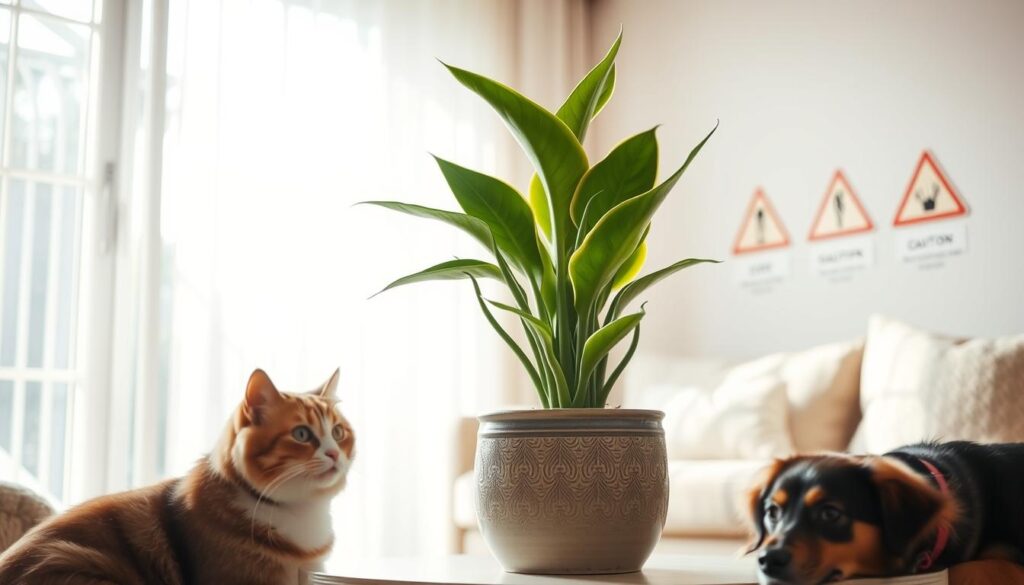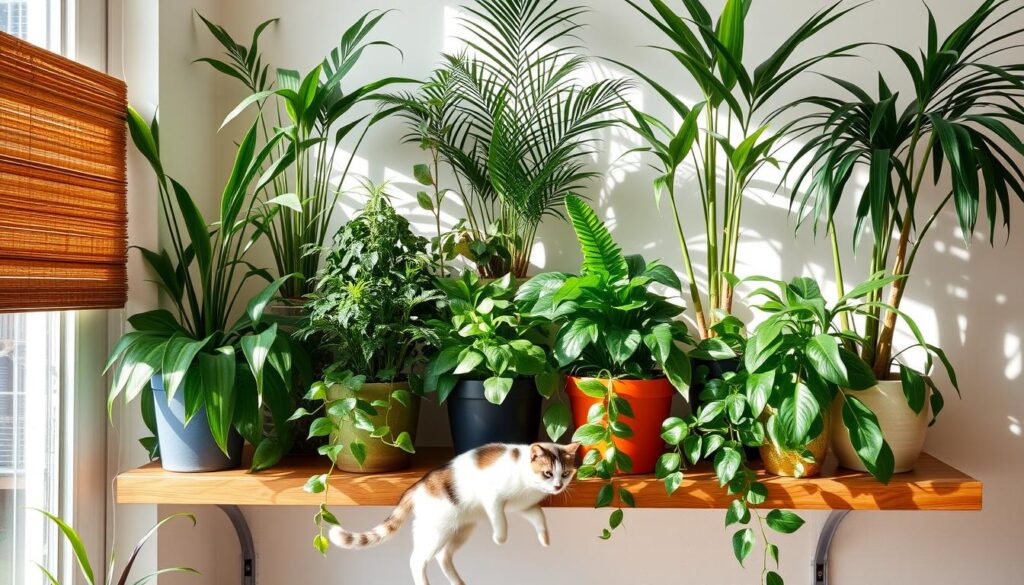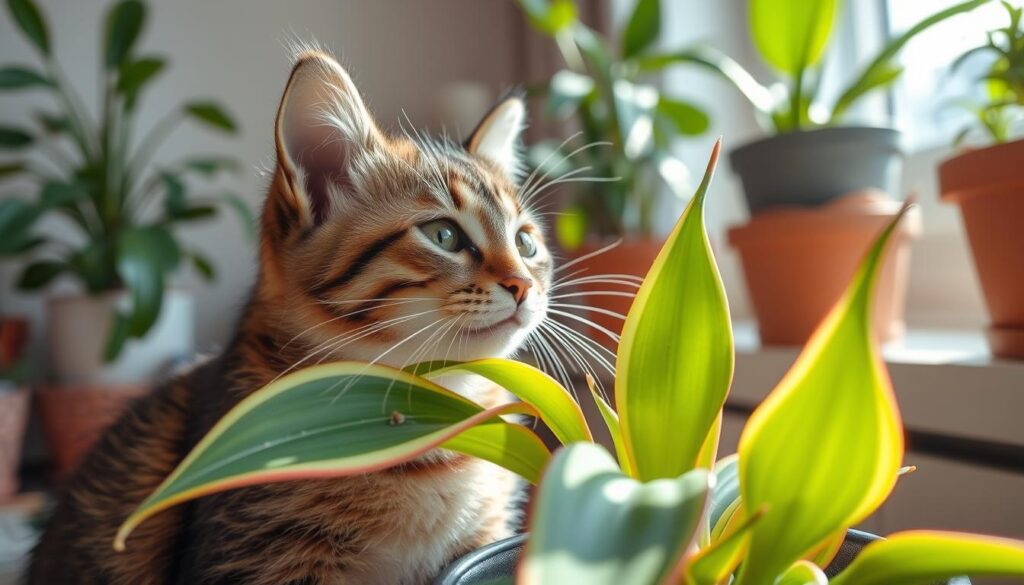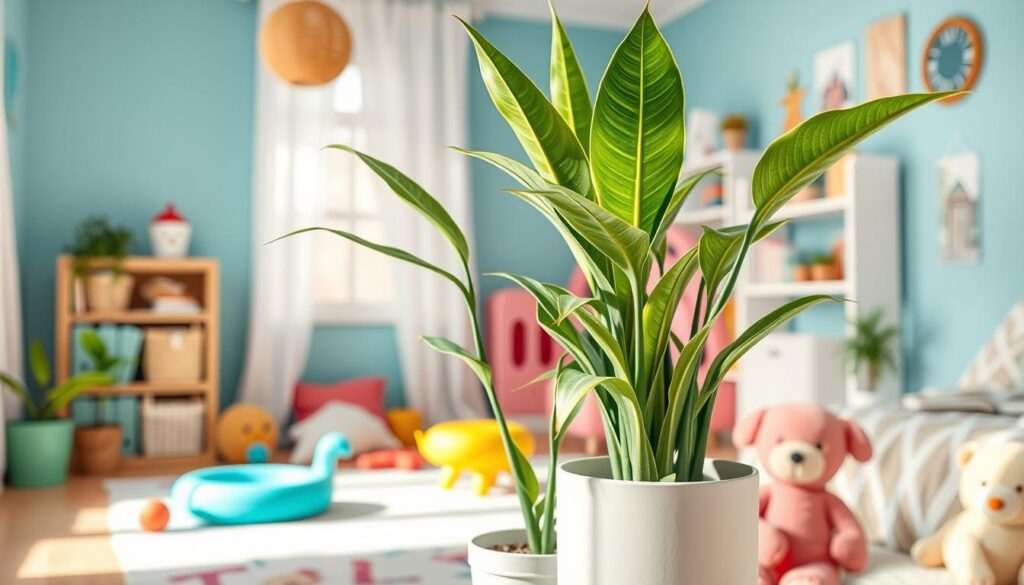As a pet owner keeping my furry friends safe is my top priority Choosing the right houseplants is important The snake plant is popular for its beauty and toughness But is it safe for pets.
In this article well look into snake plant toxicity and its effects on pets Well explore the key points to help you decide if snake plants are right for your home.
Understanding Snake Plants and Their Potential Dangers
Snake plants also known as Sansevieria or mother in laws tongue are popular for indoor décor. They are known for being resilient and having a unique look. But it is important to know the dangers they can pose especially for pets.
Common Varieties of Snake Plants in Homes
In homes you will often find the cylindrical Sansevieria trifasciata, the flat-leafed Sansevieria laurentii, and the dwarf Sansevieria Hahnii. These plants are great because they can grow well in many conditions. This makes them a favorite for people who are always busy.
Chemical Compounds in Snake Plants
Snake plants have chemicals like saponins and calcium oxalate crystals. These can be harmful to pets if they eat them. They can cause irritation, stomach problems, and even damage to organs.
Toxic Components and Their Effects
- Saponins: These can make pets vomit, have diarrhea, and feel tired.
- Calcium Oxalate Crystals: Eating these sharp crystals can hurt, swell, and irritate the mouth, tongue, and stomach.
Knowing the dangers of snake plants is key for pet owners. It helps them make their homes safe and pet-friendly.
“Pets are family, and their safety should be a top priority when it comes to the plants we bring into our homes.”
| Variety | Characteristics | Toxicity Concerns |
|---|---|---|
| Sansevieria trifasciata | Cylindrical, upright leaves | Saponins, calcium oxalate crystals |
| Sansevieria laurentii | Flat, broad leaves | Saponins, calcium oxalate crystals |
| Sansevieria Hahnii | Dwarf, rosette-forming | Saponins, calcium oxalate crystals |
Are Snake Plants Toxic to Pets: What Research Shows
Many pet owners worry about snake plants being toxic to their pets. Luckily, recent studies have shed light on the risks these plants might pose.
A study in the Journal of the American Veterinary Medical Association found snake plants contain saponins. These can harm pets if eaten. They might cause stomach problems, vomiting, and even liver damage in dogs and cats.
| Pet Health Risks | Symptoms of Exposure |
|---|---|
| Gastrointestinal issues | Vomiting, diarrhea, abdominal pain |
| Liver damage | Lethargy, loss of appetite, jaundice |
| Skin irritation | Redness, swelling, itching |
Researchers at the University of California, Davis, also studied this. They found symptoms can vary based on how much plant is eaten and the pet’s sensitivity. Even a small amount can cause big health problems.
While the studies show risks, not all pets will react badly to snake plants. The main thing is to keep your pets away from these plants to avoid any issues.
“It’s better to be safe than sorry when it comes to the health and well-being of our pets. Keeping snake plants out of reach or opting for pet-friendly alternatives is a wise choice.”
Symptoms of Snake Plant Poisoning in Animals
It’s important to know the dangers of snake plants for pets. Knowing the symptoms helps pet owners act fast. This can prevent serious health problems.
Signs in Dogs and Puppies
Dogs and puppies may vomit, have diarrhea, or feel very tired if they eat snake plants. They might also drool, have belly pain, or have trouble breathing. Watch your dogs closely and get vet help if they eat snake plants.
Signs in Cats and Kittens
Cats and kittens can also get sick from snake plants. They might vomit, not want to eat, or drool a lot. Some cats may have stomach problems or diarrhea. If you think your cat ate a snake plant, get vet help fast.
Emergency Response Guidelines
If you think your pet ate a snake plant, act quickly. Call your vet or a pet poison hotline for advice. They might tell you to make your pet vomit or give them medicine. Quick action is key to keeping your pet safe.
Knowing about pet health risks from poisonous plants for pets like snake plants helps keep pets safe. Early action and vet care are crucial for your pet’s health.

Safe Alternatives: Pet-Friendly Houseplants for Your Home
As a pet parent, keeping your furry friends safe is key. If snake plants worry you, there are many safe houseplants for your home. These plants are not only beautiful but also clean the air without harming your pets.
Here are some pet-friendly houseplants safe for dogs and cats:
- Spider plant (Chlorophytum comosum)
- Peperomia plants
- Boston fern (Nephrolepis exaltata)
- African violet (Saintpaulia)
- Nerve plant (Fittonia verschaffeltii)
- Haworthia succulents
These non-toxic houseplants are not just pretty. They also purify the air and help reduce stress. They make your home a healthier, safer place for your pets.

When picking pet-friendly houseplants, make sure they fit your home’s conditions. With the right choices, you can have beautiful plants without risking your pets’ safety.
Prevention and Safety Measures for Pet Owners
As a responsible pet owner, it’s key to keep your pets safe from toxic plants like snake plants. You can do this by placing plants carefully, training your pets, and making pet-safe areas in your home. This way, you can enjoy having pets and beautiful houseplants together.
Strategic Plant Placement
One effective way to stop pets from eating snake plants is to put them out of reach. Place them on high shelves, in terrariums, or in rooms pets can’t get into. This simple step helps keep pets safe and plants healthy.
Training Your Pets
Teaching your pets to stay away from snake plants is also important. Use positive training to teach them to leave plants alone. Reward them when they ignore the plants. This teaches them to be cautious around these plants.
Creating Pet-Safe Spaces
Setting up pet-safe areas in your home is another good idea. Create play or rest spots where pets can be safe from plants. This lets your pets play and rest without worrying about harmful plants.
FAQ
Are snake plants toxic to pets?
Yes, snake plants can be harmful to pets like dogs and cats. They have steroidal saponins that can cause vomiting, diarrhea, and breathing problems if pets eat them.
What are the potential dangers of snake plants for pets?
Snake plants have steroidal saponins that can harm pets. Eating them can lead to vomiting, diarrhea, and breathing issues. In severe cases, it can even damage a pet’s liver.
How can I tell if my pet has been poisoned by a snake plant?
Signs of snake plant poisoning include a lot of drooling, vomiting, diarrhea, feeling very tired, and trouble breathing. If you think your pet ate a snake plant, call your vet right away.
What should I do if my pet ingests a snake plant?
If you see your pet eating a snake plant, call your vet immediately. They might suggest making your pet vomit or other emergency steps. Quick action is key, as snake plant poisoning can be very dangerous.
Are there any safe, pet-friendly houseplants I can keep at home?
Yes, there are many safe houseplants for pets. African violets, bamboo, Boston ferns, Chinese evergreens, and spider plants are good choices. Always check if a plant is safe for pets before bringing it home.
How can I pet-proof my home to prevent snake plant accidents?
To keep your home safe, keep snake plants and other dangerous plants out of your pets’ reach. You can put them on high shelves or in rooms pets can’t get into. Training your pets to stay away from plants is also a good idea.

